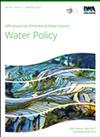社交网络和其他被遗忘的斐济讲卫生环境的组成部分
IF 1.8
4区 环境科学与生态学
Q4 WATER RESOURCES
引用次数: 0
摘要
太平洋岛屿国家是世界上获得改善的饮用水源和卫生服务机会最低的国家之一。由于地理、气候、灾害的高频率和严重程度、交通困难和资源限制,政府和私营部门对农村人口的支持有限,而且可能继续如此。然而,由于该区域独特的人口特征,城市中心和海外的农村亲属向农村地区提供了大量支持,这取决于互惠、自助和义务等强有力的社会文化规范。本文以斐济为重点,考察了如何利用精选的社会网络来支持改善农村供水和卫生状况。结果表明,以亲属关系为导向的城乡联系、选定的习惯规范、关系和做法、共同利益协会(如村庄发展委员会)和选定的社交媒体团体,都是斐济讲卫生运动有利环境的关键组成部分。考虑到太平洋岛屿地区的独特特点,利用现有的社会网络来支持改善农村水和卫生设施的成果,对于寻求加强农村水和卫生服务成果的政府和非政府组织来说,可能构成一个富有成效的社区水管理“+”战略。本文章由计算机程序翻译,如有差异,请以英文原文为准。
Social networks and other forgotten components of the WaSH enabling environment in Fiji
Pacific Island countries have among the lowest access to improved drinking water sources and sanitation services in the world. Due to geography, climate, the high frequency, and severity of disasters, transportation difficulties and resource constraints, government and private sector support to rural populations are limited and likely to remain so. However, the unique demographic characteristics of the region see considerable support flowing to rural areas from village kin in urban centres and overseas, hinged on strong socio-cultural norms of reciprocity, self-help, and obligation. Focusing on Fiji, this paper examines how select social networks are being used to support improved rural water and sanitation outcomes. Results demonstrate that kinship-orientated urban–rural linkages, select customary norms, relations and practices, common interest associations (such as village development committees), and select social media groups, all constitute critical components of the WaSH enabling environment in Fiji. Given the unique character of the Pacific Islands region, leveraging existing social networks to support improved rural water and sanitation outcomes may constitute a fruitful community water management ‘plus’ strategy for both governments and non-government organisations seeking to strengthen rural water and sanitation service outcomes.
求助全文
通过发布文献求助,成功后即可免费获取论文全文。
去求助
来源期刊

Water Policy
环境科学-水资源
CiteScore
3.10
自引率
12.50%
发文量
81
审稿时长
6-12 weeks
期刊介绍:
Water Policy will publish reviews, research papers and progress reports in, among others, the following areas: financial, diplomatic, organizational, legal, administrative and research; organized by country, region or river basin. Water Policy also publishes reviews of books and grey literature.
 求助内容:
求助内容: 应助结果提醒方式:
应助结果提醒方式:


